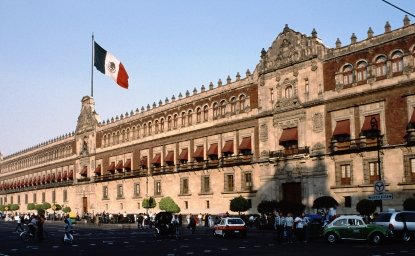Democratic ways and means are only one method among many other options: popular assemblies, delegate conventions, surveys, or primaries. Even what in Mexico is denominated as dedazo (a term used to describe Mexican politicians who in the 20th century were able to hand pick their successor) is valid, although Javier Aparicio’s magnificent article in Excelsior gives me doubt (El dedazo iluminado). I insist, as political parties are, above all, a means to ascend to power, their main objective to secure is winning office. From a pragmatic perspective, the best method is that which maximizes the probability of winning.
What is inadmissible is fooling people. What irritates me is insulting the party members and the general public’s intelligence with rhetoric about a method without credibility, or attempting to pass a method which is not democratic as if it were. There was no need for this. Andrés Manuel López Obrador could have asked Morena’s party leadership in Mexico City to declare that, after a thoughtful deliberation within the party, their party nominee would be Claudia Sheinbaum.
What is not yet clear is if López Obrador had considered in his personal candidacy selection method the consequences of his decision. I do not see his leadership at risk. What is visible on the horizon is the possibility of Ricardo Monreal ‘trying his luck’ and not falling in line. The possibility exists that he mobilizes his followers in the Cuauhtémoc borough and uses its resources against Morena, dividing their vote and making it easier for the opposition to win. It is not a small thing. In the borough he commands, there are 481,939 voters, and Monreal won that office from the PRD-PT-PANAL coalition in 2015 by a seven percentage point margin. Since then, he has created an important clientele, and he manages the not insignificant amount of 3 billion pesos from its budget.
And Monreal does not seem conformed and disciplined as the other losing candidates who, as soldiers, did not ask for an explanation. They complied.
His words are revealing and are very similar to what his leader has taught him, and they perfectly describe their life’s philosophy: I quote two of them. “I am one of those old ones, that offers his word and fulfills it, unless there is no other remedy” and “we’re going to do what the people want and decide.” To conclude, he warns that “this chapter is not closed; the history of Mexico City is yet to be written.” As has happened in previous campaigns, López Obrador makes mistakes that when summed up showcase him as an authoritarian leader. He tangles himself in such a way that in the end his credibility as a potential democratic leader is tarnished. It makes it impossible to think of him as a ruler that believes in deliberation, in debate, in transparency, in the principle of maximum disclosure, in institutions, in criticism, and in negotiation, which by definition fortunately characterize democracy.
If for the election of his party’s candidate to the Mexico City government, he banned debate, repressed deliberation, impeded transparency, rejected disclosure (even expost), used ad hoc “institutionality,” silenced criticisms, and denied negotiations, then what can be expected of his decision making if he becomes President? López Obrador only believes in himself and the infallibility of his decisions. It follows that he asks his supporters for a blind trust in him and absolute discipline. He asks them to suspend any critical judgement because there is no one better than him to know what to do, with whom to do it with, and with what motives. We do not deserve reasons, much less explanations. Philosophical skepticism defined as a critical attitude and the value of asking questions have no space in his movement. López Obrador practices dogmatism, in other words, absolute knowledge and absolute certainty. Is this the way he would run the country?
If Morena wins the Mexico City government, I believe that Claudia Sheinbaum would be a better and more honest Mayor than Monreal, and that she has the merits to hold that office. I can testify, by my own experience, that she has been listening to voices beyond the closed López Obrador circle, collecting ideas about the main issues the city faces and the solutions and alternatives, and that she acknowledges the criticisms of her party and even of its leader. It is not a small feat. However, the problem is not Sheinbaum, but rather what the “election” process made completely visible: the way AMLO would exercise power in the presidency.
The views expressed here are solely those of the author.
Author

Mexico Institute
The Mexico Institute seeks to improve understanding, communication, and cooperation between Mexico and the United States by promoting original research, encouraging public discussion, and proposing policy options for enhancing the bilateral relationship. A binational Advisory Board, chaired by Luis Téllez and Earl Anthony Wayne, oversees the work of the Mexico Institute. Read more

Explore More
Browse Insights & Analysis
The Mexico Institute's 2018 Elections Guide



